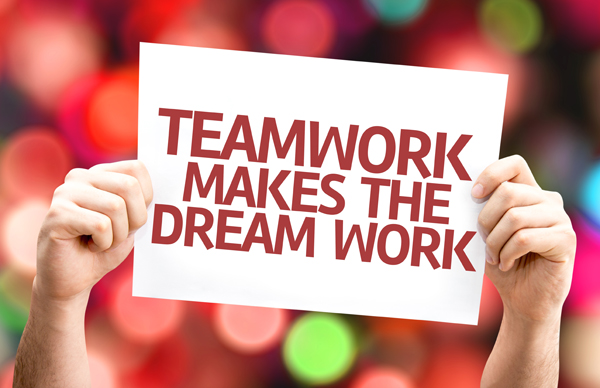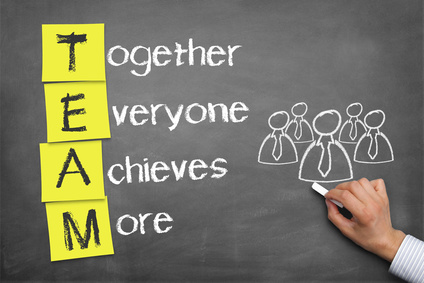
Teamwork is an essential and useful trait in all sectors of life. It’s a cornerstone for building collaborate environments, respecting various viewpoints, and helping to build thriving projects and businesses. Without strong cooperation, communication and innovation fails to take firm root in our everyday lives.
A vital soft skill for many projects and assignments in college, teamwork is also needed in the everyday business world. However, teamwork takes on different forms in different settings and allows us to learn lessons within the art of collaboration.
As you start your business and delve into internships in college, you may notice similarities and differences between the ways teamwork is handled in school and work environments. Assessing the lessons that teamwork have to offer in both realms can help you determine which aspects to utilize in your professional life.
If you’re still in school and wishing to develop your teamwork skills? Here’s some helpful advice on the basic differences between teamwork lessons in school and work so you may optimize your time and skills for your own personal business success.
Lessons on Teamwork in School and Work

Lesson #1: Group Communication
In both school and the real world, you’ll need to know how to communicate with others. Teamwork in the classroom is a great way to prepare you for real world business. In fact, it’s probably one of the most useful skills you’ll ever learn in your professional and social life. However, there are differences between the ways you’ll learn and experience communication in school and work.
School: In academia, communication will most likely be harmonious, but it’s not likely to be in-depth. Generally, students have a congenial attitude towards a common goal or project with fellow classmates, especially if everyone is being graded as a group and if it helps save time. However, this means you don’t find advanced solutions to problems. It can be limiting working within school guidelines and project-specific constraints. But, at least you’ll get great practice focusing on a specific topic.
School can offer you important foundations for building upon your communication skills in a team. You can learn how to communicate ideas or details about a project for which you’re dedicated.
Work: In the business world, it’s likely you’ll need to flex your negotiation skills often. While remaining respectful to everyone you work with, as a business leader you must leverage ways to build your brand and service to clients. When you’re part of team, you need to debate and be vocal when you disagree about details in the deal. Once you lay everything out on the table, you can come to a solid conclusion about how to best approach the deal while making a solid profit.
Words of Wisdom: Research shows that well-managed conflict and focus on a group objective can create more solutions than in conflict-free groups. As long as conflict is focused on the actual work, disagreements can harness brainstorming power. Use class to work on your collaboration skills and focus, but take a class or take advantage of your internship where you can learn how to negotiate and debate within business.
Lesson #2: In-person interactions
School: When you’re in college, face-to-face interactions between groups may be needed to complete a project. However, because lesson plans consider the number of course hours required of students outside of the classroom, much group collaboration in college is completed remotely. Generally, there is a limited amount of time students engage with each other directly in and out of class. Although, this can be an effective way to cooperate and build upon communication skills, teams who do the majority of their work remotely are at a disadvantage.
Work: Teamwork and collaboration are much more in-depth in a work environment. Although you’ll utilize a lot of face time, offices allow you to work directly with people on numerous projects throughout the day. Plus, you’ll have more in common with workers than you will with students.
Words of Wisdom: Remote working teams are disadvantaged. My advice is to take classes that are interactive enough to build your entrepreneurial skills outside the classroom.
Lesson #3: Diversify and preserve your team
School: You may have the opportunity to work with diverse individuals with wide-ranging perspectives, but for each project you work on in class, your groups will change. Frequently changing teams is a huge disadvantage for teamwork and personal growth.
Work: Business leaders can learn to work with who they hire and they also hire from a diverse and competitive pool of people. In addition, they get to work with the same group of employees for as long as they’re employed with the company. This helps build morale and comfort within the workplace.
Words of Wisdom: Studies indicate that the longer members stay together, the stronger the performance of the group. Since the majority of employers think alumni today are underprepared for jobs in areas like teamwork, students should pay attention in their courses to diverse perspectives so they can build a more well-rounded knowledge. In fact, 59% of employers believe that all students should have educational experiences where they solve problems with people of different perspectives. Teams that play together, stay together once you bridge barriers.
Lesson #4: Smaller groups work better
School: Large universities may offer you more resources, but they also make for overcrowded classrooms and groups where learning, collaboration, and focus are much harder to sustain.
Work: Excessive size can ruin effective collaboration, but many businesses understand that smaller groups can work better as a team.
Words of Wisdom: In smaller teams, the work is divided more equally across members and you have less of a chance of “free loaders” tagging along for the ride. If you must work in a larger group in class, make sure the work is divided up equally and that everyone is playing an equal part. While in school, offer each your classmates resources to build a more supportive work environment. This can easily translate into your teamwork skills in business.
From the Blackboard to the Boardroom

In academic settings, teachers and students study theories and examples. They test hypotheses against evidence to find conclusions that may be universal or decontextualized, but in the business world you put these ideas to use.
Overall, there are lessons to be gleaned from each team working experience. However, school is more individualistic and theory-based, which can be beneficial in its own right. Yet, it only teaches you a few foundations of collaboration in the real world.
Instead, start building upon your teamwork skills by picking up an internship, starting your own business, or volunteering in school or community organizations and fundraisers. You’ll have more practice to network easier, but you’ll also build experience solving fundamental problems with the help and discretion of a strong and collaborative team. In the meantime, have fun getting to know people and offer a kind, open-minded attitude towards people of various backgrounds as you learn the ropes. You can demonstrate success in business by working with and supporting those around you.


